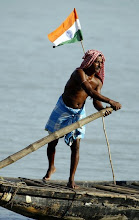
Stepping into history, Barack Hussein Obama grasped the reins of power as America's first black president on Tuesday, declaring the nation must choose "hope over fear, unity of purpose over conflict and discord" to overcome the worst economic crisis since the Great Depression.Young and untested, Obama is a man of enormous confidence and electrifying oratorical skills. Hopes for Obama are extremely high, suggesting that Americans are willing to give him a long honeymoon to strengthen the economy and lift the financial gloom.
If 9/11 changed the Bush presidency, global hotspots, some a continuing legacy of the war on terror, will give Obama little respite. On his first day in office on Wednesday, he is expected to name George Mitchell as special envoy for the Middle East, indicating he has an eye on the Israel-Palestine conflict.By the end of the week, Obama will move to end one of the most controversial chapters in US history when he signs an executive order which will eventually end the military detention facilities at Guantanamo Bay and move on how to deal with some 250 remaining inmates, at least some of whom are hardcore jihadis whom no country, even less squeamish allies like Poland and Egypt, are willing to host.
India is no exception as Obama’s elevation to power has been largely met with optimism. The only sore note, if one can call it that, has been the new president’s inclination to draw a link between the situation on Pak-Afghan border and the J&K dispute between India and Pakistan which many in the West believe can lead to a flare-up on Pakistan’s eastern border.
However, the good news for India is that Obama has already declared that the war on terror during his regime is going to focus on Afghanistan-Pakistan and not Iraq. This clearly authenticates India’s stand that it is important to sort out these two countries to root out terrorism. Obama’s predecessor had been pilloried for the US follies in launching an all-out war on Iraq and Obama’s decision to withdraw troops from that country has been greeted well by the world community. In that sense, Obama has already started to make a difference.
India, of course, would want to ward off any attempt by the Obama administration to force a resolution of the J&K dispute on the pretext of ensuring more cooperation from Pakistan in the war against terror. However, Obama clearly understands that India looks upon J&K as a bilateral dispute, with the world community having little or no role in it, and is unlikely to disturb the balance.
Another likely bone of contention between India and the US could be the Democrats’ insistence on India signing the CTBT and NPT. However, India’s stand on both the issues is so clearly spelled out that any attempt to force India could lead to an ugly situation which Washington may want to avoid.
However, the good news for India is that Obama has already declared that the war on terror during his regime is going to focus on Afghanistan-Pakistan and not Iraq. This clearly authenticates India’s stand that it is important to sort out these two countries to root out terrorism. Obama’s predecessor had been pilloried for the US follies in launching an all-out war on Iraq and Obama’s decision to withdraw troops from that country has been greeted well by the world community. In that sense, Obama has already started to make a difference.
India, of course, would want to ward off any attempt by the Obama administration to force a resolution of the J&K dispute on the pretext of ensuring more cooperation from Pakistan in the war against terror. However, Obama clearly understands that India looks upon J&K as a bilateral dispute, with the world community having little or no role in it, and is unlikely to disturb the balance.
Another likely bone of contention between India and the US could be the Democrats’ insistence on India signing the CTBT and NPT. However, India’s stand on both the issues is so clearly spelled out that any attempt to force India could lead to an ugly situation which Washington may want to avoid.












